Oren fast-tracked to CAR T-cell therapy for rare Ph-like ALL
Diagnosed with a rare ALL sub-type last year, Oren London had only just begun chemotherapy before being accepted for CAR T-cell therapy in Australia.
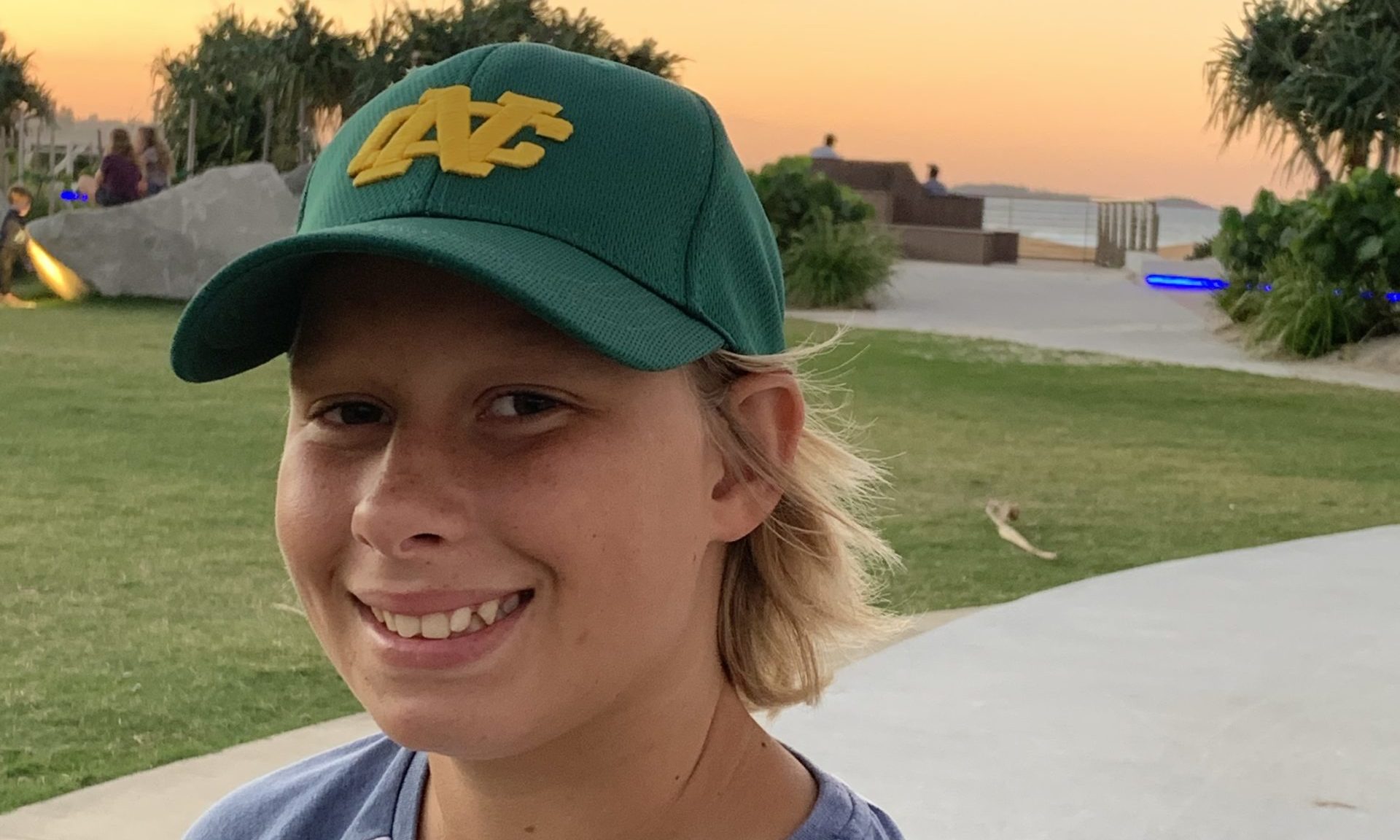
A sports-loving 12-year-old, Oren had competed in a state swimming championship and weekend rugby matches in July 2019 when his mum, Fiona Snell noticed a series of changes in her son.
“Suddenly, he became really lethargic and lost motivation… he’d fall asleep anywhere,” explained Fiona.
“Then there was the bruising and weight loss, which I originally put down to puberty.
“After a sports injury in a footy game, he started having severe shoulder pain and he’d come out of physio sessions screaming.
“Then his appetite was almost non-existent, he began complaining of tummy aches, and was looking grey.”
After three weeks of these symptoms, with no improvement, Fiona took Oren to their local doctor in hometown Pottsville on the New South Wales north coast.
They were sent straight to hospital after the doctor noticed Oren’s spleen and liver were enlarged.
“We arrived at Emergency and got the red-carpet treatment straight through,” said Fiona.
Finally, after three hours of tests, the medical team told them that Oren had leukaemia.
“That’s when my whole world fell apart.”
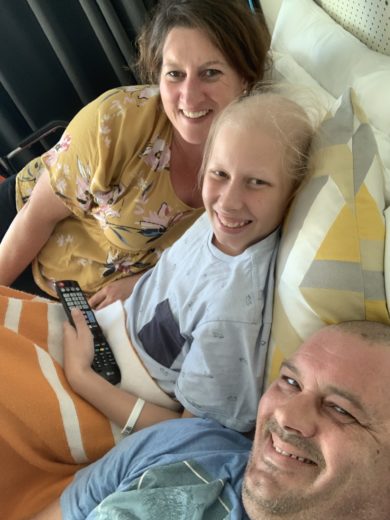
Only a few hours earlier, Fiona had thought Oren would be given antibiotics and they’d be on their way.
“It was tough, especially having to break that news over the phone to my hubby, Jason,” said Fiona.
“I told him to get a bag ready and bring it up to the hospital with our daughters, Nylah, 9 and Amara, 10.”
Treatment resistance and organ failure
Oren and Fiona were medically transferred from the Tweed hospital to Brisbane, so Oren could begin chemotherapy immediately, and his diagnosis was confirmed as acute lymphoblastic leukaemia (ALL).
Four days into treatment, Oren’s kidneys started to fail, and he went to intensive care.
“The chemo started to attack all his organs and he developed tumour lysis syndrome*,” said Fiona.
Oren was put on dialysis to improve his kidney function and it took two weeks for his blood levels to improve enough to continue having chemotherapy.
“He ended up with high blood pressure, had seizures, and was sent back to the paediatric intensive care unit.”
CT scans and an MRI showed he had Posterior Reversible Encephalopathy Syndrome**.
Oren’s medical team became increasingly concerned that he had not achieved remission from his first month of treatment and ordered regular bone marrow aspirates and lumbar punctures.
Further studies of his bone marrow revealed that Oren had a mutation and sub-type of ALL, called Philadelphia-like ALL diagnosis (Ph-like ALL).
“We were told this particular mutation is quite strong and rare,” said Fiona, and this explained his resistance to chemo.
Preparations began for Oren to have a bone marrow transplant and he was set up to have full body radiation.
“His sister, Amara, was an exact donor match,” said Fiona.
Then, suddenly, Oren became a successful candidate for CAR T-cell therapy.
Fast-tracked to CART-cell therapy
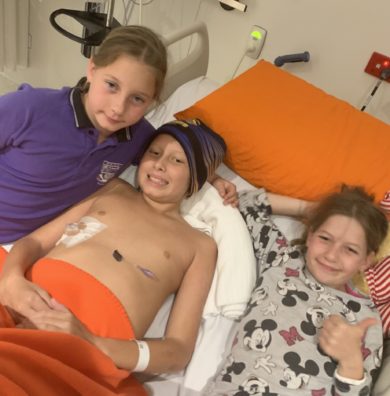
Fiona said that Oren’s case, being so rare, was put before the board of CAR T-cell experts at the Royal Melbourne Hospital for consideration for the therapy, Kymriah® (tisagenlecleucel), which had only recently become available in Australia
“I had learned a little bit about CAR T-cell therapy through my research of Ph-like ALL,” she said.
“I understood it was normally for kids that had gone through two and a half years of treatment, had already tried a bone marrow transplant, and had a second or third relapse.
“They had to know Oren wasn’t going to survive the two and a half years of preliminary treatment for him to be approved for CAR T-cells after only three months of treatment.”
The London family was notified in November 2019 that Oren had been approved for the new form of immunotherapy and they travelled to Melbourne to have his T-cells collected.
“Oren was the first child from Queensland Children’s Hospital and the sixth child in Australia to have CAR T-cell treatment,” said Fiona.
“The Australian government had just given the funding and we were so lucky to have a supportive oncologist who really went to bat for us.
“His T-cells were sent to the U.S., to have the CAR-receptor put on them, which took about four weeks.”
During that time, the Londons returned to Brisbane and Oren had maintenance chemo before going back to Melbourne in January 2020 so Oren could receive his now ‘super-charged’ T-cells.
“We stayed for seven weeks and I don’t want to say it was a walk in the park but compared with what he had been through with the chemo, it was amazing,” said Fiona.
“He had a small reaction of high temperatures but when they did the bone marrow aspirate and a lumbar puncture 30 days later; we had hit remission.
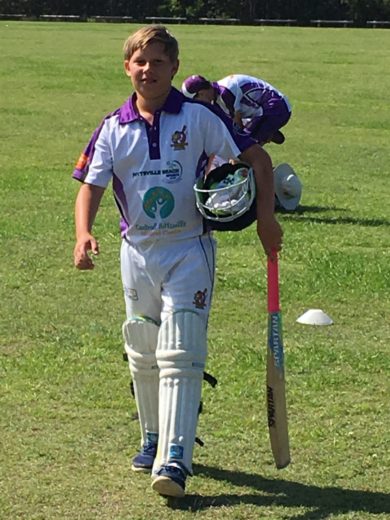
“I got my boy back. I now have my smiling, eating, walking, talking 13-year-old back.”
Home to a pandemic
On February 23, the family returned to Pottsville.
“The girls had just returned to school full-time, and Oren part-time, when the COVID-19 pandemic hit,” said Fiona.
“I took the kids out a week before the schools made that decision to close. We had been through too much for too long to take any chances.
“It was a great time for us to bond again in our own home for the first time in six months. It really brought us back together as a family.
“Now the kids are back at school and Oren has started footy training and taking his position on the field for a full game.”
Looking to the future
For six months after his CAR-T treatment, Oren had monthly check-ups and bone marrow aspirates in Brisbane, and for the rest of his life Oren will need regular intravenous immunoglobulin therapy (IVIg) due to his non-existent immune system.
“We had hoped to switch to subcutaneous immunoglobulin which he could have injected weekly,” said Fiona, but unfortunately this was not possible, due to the current COVID-19 border crossing issues.
“At the one-year mark, in January 2021, we are due to return to Melbourne for his annual check-up.”
Improving access to CAR T-cell therapy
After their experience, Fiona is keen to see CAR T-cell therapy become a frontline treatment for others diagnosed with childhood ALL.
“If this is how they can treat kids with ALL down the track, and not have to go through any of that chemo for two and a half years, it will change the game completely,” said Fiona.
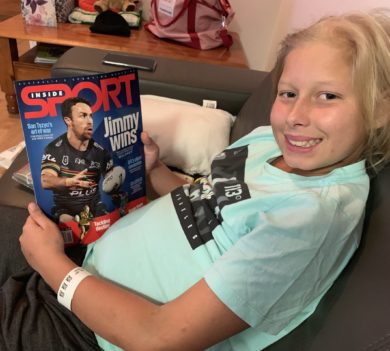
“We were very lucky because a year ago we would have had to fund a trip to the U.S. to even get on the treatment and I’ve heard of people selling their houses to do so.
“To my knowledge, it can be up to $500,000 to access CAR T-cell therapy there and the ongoing costs for IVIg are expensive.
“Research is progressing at such an impressive rate and I’m so thankful for all those people in the past that have been through the trials and testing to get CAR T-cell treatment to the place it is now.”
Click here to read about an exciting new research project into Ph-like childhood ALL that the Leukaemia Foundation is funding.
* Tumour lysis syndrome occurs when a large number of cancer cells die within a short period, releasing their contents into the blood.
** Posterior reversible encephalopathy syndrome is a rare condition in which parts of the brain are affected by swelling, characterised by a headache, seizures, altered mental status, and visual loss.